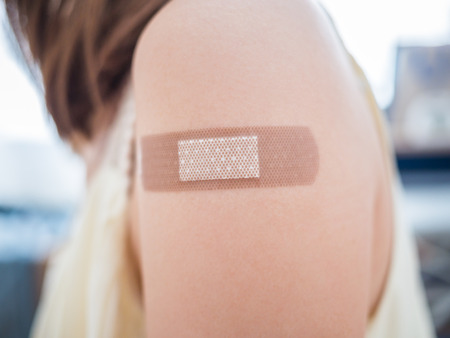Background

During the 1980s, parents of children harmed or killed by the DTP vaccine (diphtheria/tetanus/pertussis) and other vaccines began bringing lawsuits against vaccine manufacturers and health care providers that administered these vaccines. Fearful that these lawsuits would result in vaccine shortages, deter the production and development of additional vaccines, and reduce vaccination rates in the United States, Congress created the National Vaccine Injury Compensation Program (NVICP).
In 1988, as part of the NVICP, the federal government established The Vaccine Injury Compensation Trust Fund to both compensate those injured or killed by vaccines and to ensure a continued production of necessary vaccines. Funded by a $.75 excise tax that is charged on each dose of vaccine purchased, the proceeds from these taxes then go into the Trust Fund which is managed by the Department of Treasury. Instead of suing vaccine manufacturers and health care providers directly, the Trust Fund serves as an additional way to compensate eligible individuals who were injured from vaccines covered by the National Childhood Vaccine Injury Act. Now, decades later, the Trust Fund has paid out billions of dollars in damages to thousands of people who suffered injuries from vaccines.
How It Works
Instead of initiating a formal lawsuit, individuals file a claim for compensation, called a petition, with the Court of Federal Claims in Washington, D.C. Not all attorneys can practice in this Court and instead have to be specially admitted. The person on whose behalf the claim is filed is called the petitioner. Once the petition is filed, a Special Master is assigned to the case. A Special Master is a specialized judge that only presides over vaccine injury claims. If necessary, the Special Master will decide the outcome of the claim instead of a jury as in a normal tort case.

In vaccine cases, the Department of Health and Human Services (who helps oversee the Vaccine Injury Trust Fund) acts as the defendant and is represented by attorneys from the Department of Justice (DOJ). After a petition is filed, the DOJ attorneys and the HHS physicians will decide whether to contest the claim that the vaccine caused the injury and meets the legal and medical criteria for compensation or whether to concede and admit that the vaccine was the cause of the injury. A report is filed by the DOJ attorneys with the Court articulating their position on this issue.
If the HHS and DOJ concede that the vaccine was the cause of your injury, the claim proceeds onto to the damages phase. If the HHS and DOJ do not concede causation, the case will proceed to an initial entitlement hearing on the subject of whether the vaccine caused your injury. Usually the hearing is held at the nearest federal courthouse or other facility close to where the petitioner resides. At the hearing various individuals can testify including yourself, family members, friends, doctors, and other experts hired on your behalf. The HHS may also call an expert physician to testify as to why the vaccine did not cause your injury. At the conclusion of the hearing, the Special Master will make a ruling on this issue.
If compensation is denied by the Special Master, the decision may be appealed through the normal U.S. court system. If the Special Master decides in your favor, the claim will proceed to the issue of damages. In our experience a majority of the cases are settled at this point, however, if an amount cannot be agreed upon by the parties, the claim will proceed to a second hearing to determine the amount of damages. When compensation is awarded, the award will include an amount for attorney fees and other costs.
Below is a list of frequently asked questions regarding the NVICP and Claims Process.
Frequently Asked Questions

Who Can File a Vaccine Injury Claim?
You may file a claim if:
- You received a vaccine covered by the National Vaccine Injury Compensation Program (NVICP) and believe that you were injured by this vaccine; or
- You are a parent or legal guardian of a child or disabled adult who received a vaccine covered by the NVICP and believe that the person was injured by this vaccine; or
- You are the legal representative of the estate of a deceased person who received a vaccine covered by the NVICP and believe that the person’s death resulted from the vaccine injury.
It is not necessary to be a United States citizen to be eligible for compensation. Some people who receive vaccines outside of the U.S. may be eligible for compensation. Usually, in order to be covered by the NVICP when overseas, the injured person must have been a U.S. citizen serving in the military or a U.S. government employee, or have been a dependent of such a citizen; or the injured person must have received a vaccine manufactured by a vaccine company located in the U.S. and returned to the U.S. within 6 months after the date of vaccination.
What Type of Injury Must Have Been Sustained?
There are no specific types of injuries that must be sustained in order to entitle a petitioner to compensation, however, the effects of that person’s injury must have:
- Lasted for more than 6 months after the vaccine was given; or
- Resulted in a hospital stay and surgery; or
- Resulted in death.

See our Vaccine Injuries Section for a list and discussion of common injuries and adverse reactions.
Which Vaccines are Covered?
- Diphtheria and Tetanus toxoid-containing vaccines (DTaP, Tdap, DTP-Hib, DT, Td, TT)
- Pertussis antigen-containing vaccines (DTaP, Tdap, DTP, P, DTP-Hib)
- Measles, mumps and rubella virus-containing vaccines in any combination (MMR, MR, M, R)
- Rubella virus-containing vaccines (MMR, MR, R)
- Measles virus-containing vaccines (MMR, MR, M)
- Polio live virus-containing vaccines (OPV, IPV)
- Hepatitis A vaccines (HAV, Havrix, VAQTA, and Twinrix)
- Hepatitis B antigen-containing vaccines (HBV, Engerix-B, Recombivax HB, Twinrix)
- Haemophilus influenza (type b polysaccharide conjugate vaccines)
- Varicella (Chicken Pox) vaccine (VZV, Varivax and ProQuad)
- Rotavirus vaccine (Rota Teq) (RV)
- Pneumococcal conjugate vaccines (such as Prevnar) (PCV)
- Trivalent or seasonal influenza vaccines (TIV, LAIV) (Flu vaccines including FluMist, a live attenuated influenza virus vaccine; and injectable influenza vaccines such as FluShield, Fluvirin, Fluzone, and Afluria)
- Meningococcal vaccines (meningococcal polysaccharide vaccine (MPSV4) and meningococcal conjugate vaccine (MCV4) such as Menactra)
- Human papillomavirus (HPV) vaccines (such as Gardasil and Cervarix)
See our Covered Vaccines Section for a list and discussion of covered vaccines and common reactions and injuries to those vaccines.
Do I Need a Lawyer?

There is no requirement to work with a vaccine injury attorney when filing with the NVICP (unless the victim is not of legal adult age, or is incapable of representing themselves). However, we strongly recommend that you hire a lawyer as the program can often be very complex to navigate and can involve complicated legal, medical and damages issues. Hiring a vaccine lawyer comes at no cost to you anyway as you pay NO FEES since the NVICP pays all costs and fees.
Hiring a lawyer also gives you the best opportunity to receive the maximum compensation to which you are entitled to under the NVICP. Our firm works with immunologists, neurologists, orthopedics, dermatologists, life care planners, economists, psychologists, and other professionals to present the strongest possible case on your behalf.
Our lawyers are experienced in getting the maximum compensation for our clients nationwide. See our Decisions and Case Results Section for a discussion of some of the results we achieved on behalf of our clients.
What Will I Have to Pay Your Firm?
Our law firm charges you NOTHING. The NVICP pays for reasonable attorneys’ costs and fees separately from any compensation award. Therefore, unlike a regular personal injury case, we don’t take a percentage of your recovery. In addition, our firm, as a service to our clients, covers the up-front costs of litigating the case such as filing fees, expert witness fees, costs to obtain medical records, travel expenses, etc. This means that you pay nothing to be represented by an experienced vaccine injury lawyer.
Does My Attorney Need to be Local?
No, vaccine claims are filed with the Court of Federal Claims in Washington, D.C. This is not a “local” case that a local personal injury attorney can handle. Attorneys have to be specially admitted to practice in this specific Court. It is also not important where you live, as our firm can represent you no matter where you are located and will travel to you for any necessary hearings or meetings. What is important is that you work with a law firm that has experience in working through the NVICP, so you can get the best possible outcome.
See our Decisions and Case Results Section for a discussion of some of the results we achieved on behalf of our clients.
How Long Does the Claims Process Take?
The NVICP process is designed to be quicker than normal personal injury cases and it generally is. Depending on a host of factors, cases can often settle or proceed to a hearing in as little as a year. Other cases, however, in rare circumstances can take up to several years.
What Type of Compensation is Usually Awarded in these Cases?
The NVICP will pay monetary damages for pain and suffering, past and future medical expenses, rehabilitation and support services, past and future lost wages and economic damages, and reasonable attorneys’ costs and fees. Compensation for pain and suffering is limited to a maximum of $250,000. There is no limit on compensation for any of the other types of damages, however, including medical expenses and economic damages. Our firm works with immunologists, neurologists, orthopedics, dermatologists, life care planners, economists, psychologists, and other professionals in an effort to present the strongest claim and obtain the maximum amount on your behalf.
How Much Time Do I Have to File a Claim?
The statute of limitations in the NVICP requires a claim to be filed within 3 years of the first onset of symptoms. In order to be safe, our firm generally recommends filing a petition within 3 years of the date the vaccine was administered. In cases involving a fatality, claims must generally be filed within 2 years from the date of death.
